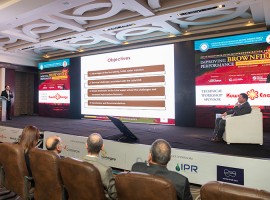By Ahnie Litecky
When the first joint venture was formed in Egypt in 1911, the oil and gas industry was in its infancy. Anglo-Egyptian Oilfields Company was a marriage of two private companies: Royal Dutch Shell and British Petroleum (BP). The company went on to be the major player in the industry for over fifty years, until it was nationalized in 1964 as the Egyptian General Petroleum Corporation (EGPC). As the oil and gas industry has expanded and shifted in the years since, joint ventures have played a significant role.
In some ways, Egypt benefits greatly from the joint venture model in the oil and gas industry. However, as the world continues to suffer the effects of low oil prices, increased flexibility in the joint venture model may help Egypt to maintain its status as a major player in the current market.
Joint ventures (JVs) are partnerships between two companies or between a company and the government. In Egypt, all international investors in the oil and gas industry must partner with the government to form joint ventures for the exploration and extraction of natural resources.
Hany Helmy, who has forty years of experience in the oil and gas industry working for BP, GUPCO, and now as a private consultant, describes the relationship between the national oil company and the international oil company (IOC) as a marriage. The government and the IOC take on the parental roles and together create their child: the JV. The government and company must work well together to allow the JV to thrive. If an investor leaves, then the JV is affected, just as children are affected by divorce. Just as parents remarry, a change of investor can affect the performance of a JV.
JVs are common in the oil and gas industry, because they provide many benefits without the economic risks of a merger or acquisition, according to a 2015 Ernst & Young report on joint ventures. Oil and gas explorations can sometimes be too expensive and risky for a single company or country to finance. A JV spreads the financial burden out. JVs can also help companies and countries access additional technology and infrastructure necessary to fully explore and extract resources. “The JV is the foundation for everything in this business,” contends Helmy. “You can’t stand alone.”
Helmy has extensive firsthand experience with the JV structure. He spent 12 years working for the Gulf of Suez Petroleum Company (GUPCO), one of the earliest public-private JVs in Egypt. In 1965, EGPC and AMOCO Egypt Oil Company established GUPCO as a joint venture company. BP merged with AMOCO in 1999 and took over the JV. Today GUPCO is one of the largest oil and gas operations in the region. According to the BP website, GUPCO has produced almost 40% of Egypt’s entire oil production and currently produces almost 10% of Egypt’s annual oil and condensate.
JVs and Resource Development
For Egypt, the financial benefits of the JV model are clear. Egypt can encourage and profit from oil and gas development in the country without taking on the financial risks of exploration. When a new investor wants to explore for oil and gas, he must first win an exploration license through a competitive bidding process. After being awarded the right to explore a concession, the company can look for oil and gas using a variety of technologies, such as 2D or 3D surveying or airplane surveying. The investor then makes an agreement with the Egyptian government to drill a specific number of wells within a certain time frame. If no oil or gas is present in the wells, then the company walks away and simply loses the money invested in the exploration process. However, if oil or gas is discovered, then the company must receive approval for a production license and, through the joint venture, share the production profits with the Egyptian government. The IOC recoups the money it spent on exploration and development from the Egyptian government’s profits. Also, Egypt can buy the JVs share of production at lower cost than the market value, since the IOC does not have to pay to ship the oil out of the country.
IOCs benefit from the JV too, says Dr. Moustafa Oraby, a professor at Future University and former North Africa and Middle East Technology Manager at Halliburton Energy Services. The lower overhead costs on JVs in both cost of living for expats and reasonable salaries for nationals makes Egypt more appealing to investors than other countries.
The goals of the JV model extend beyond the financial, to the protection and development of both natural and human resources. In Egypt, oil and gas JVs give the government control over resources and an ability to monitor IOCs to ensure proper extraction of those resources, according to Hisham Refaat, Managing Director of Waqud, an integrated service provider for the oil and gas industry.
In theory, the JV model also provides “a great conduit for the exchange of science, learning, and resources,” says Refaat, by creating jobs for Egyptians. JVs bring together a “cocktail” of nationals and expats, states Helmy, and their interactions can lead to valuable sharing of cultures and ideas. JVs provide crucial experience for many people who work in oil and gas, says Hany Helmy, which benefits the entire industry. One potential issue with this structure is a lack of understanding or conflict between people with different backgrounds and languages. However, Helmy recalls mostly positive interactions between Egyptians and expats during his years working for GUPCO, and he credits the welcoming attitude of Egyptians.
The exchange of technical skills is another way that the JV model benefits Egypt. Dr. Oraby notes that IOCs have the technical expertise to optimize resource extraction and reservoir management in Egypt. They can also train national engineers in technical skills. On the other side, Egyptians can share local geological and technical knowledge with the IOCs.
Industry Challenges
There are certainly many benefits to welcoming the extensive experience and resources of IOCs into Egypt. However, one significant challenge to the JV model is the differing salary and employment schemes of the government and private companies. As is common the world over, government employees are bound by the national pay system, whereas private companies can offer higher salaries and more opportunities for advancement and career development. The higher salaries at private companies often entice talented Egyptians to move to the private sector. Many Egyptians also end up moving abroad to gain more experience and skills, and the Egyptian oil and gas industry loses a valuable portion of its workforce.
Because job creation is a major goal in the JV model, these companies are heavily staffed on the national side. High employee numbers means that resources, such as trainings and incentive programs, are spread more thinly. During tough economic times, Egyptian oil fields could become uneconomical to produce due to the huge overhead of JVs, which is mostly staffing.
The Future of JVs in Egypt
In today’s volatile oil market, “companies have to be lean to survive,” argues Refaat. Many IOCs around the world have cut costs and instituted layoffs. Egypt’s JVs have adapted to the economic situation by cutting drilling and production, but they should incorporate more flexibility to reduce overhead and accommodate continuing fluctuations in the current world oil market. A willingness to examine the current JV structure may provide incentives for IOCs to ramp up exploration and development in Egypt.
When asked about the future of JVs in Egypt, Dr. Oraby is optimistic. “New horizons of gas discoveries in the Mediterranean may open a chance for other investors to come in and drill,” he argued. When oil prices eventually rise, activity in the region should pick up.
In regard to possible modifications to the current bid round to attract investors, Dr. Oraby said that it will benefit both Egypt and investors if Egypt builds a “Data Room” and makes it public, even with limited data. This will allow investors to study opportunities at all times and contact Egyptian authorities when the opportunities appear attractive.
While we wait for oil prices to stabilize, there are indications that the JV model in Egypt may be evolving. The Egyptian government recently tried a new approach with BP on a West Nile Delta concession. Under their agreement, BP will not recoup its exploration costs as in the traditional JV model. BP also has the freedom to drill wells independently and chose its own service companies, which saves the company money.
Refaat argues that entrepreneurial efforts in the oil and gas industry should be encouraged. Egyptians know oil and gas. There are many people with extensive knowledge in the industry who have gained experience working with the national companies and IOCs. Increasing support for small companies and individuals could help negate the “brain drain” Egypt currently experiences in the oil and gas industry.








